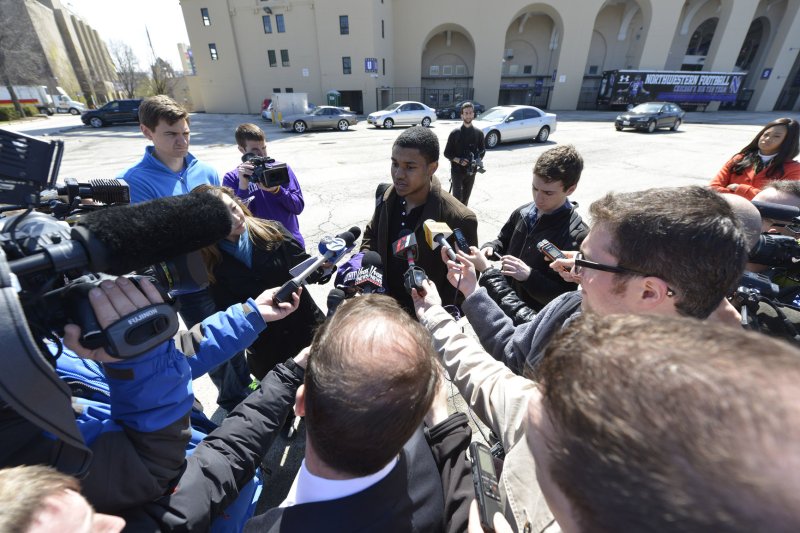1 of 6 | Former Northwestern football player Michael Odom talks to reporters at Northwestern University on April 25, 2014 in Evanston, Illinois. The players are voting Friday on whether to form the nation's first union for college athletes, a decision that has far reaching implications for amateur sports. As a former player, Odom did not vote. UPI/Brian Kersey |
License Photo
WASHINGTON, May 8 (UPI) -- At a hearing on Capitol Hill Thursday, critics of a recent National Labor Relations Board decision to allow Northwestern University's football players to vote to form a union cautioned that allowing student-athletes to be identified as employees could touch off a domino effect of unintended consequences.
While agreeing with the need to protect the educational opportunities of student-athletes in the event of injury, House Education and Workforce Committee Chair John Klein, R-Minn., slammed the regional NLRB decision and bemoaned the "rubber stamp" he suspects is coming from the national board.
Following the regional NRLB's decision to identify Northwestern's athletes as "employees," members of the university's football program voted on whether to unionize. The results of that vote were impounded, pending a decision by the national NLRB, after Northwestern appealed the ruling.
"No student athlete injured while representing their school on the field should be left behind because of the misplaced priorities of a college or university," Klein said. "Does that mean unionizing student athletes is the answer? Absolutely not."
Collective bargaining, he warned, would throw into chaos practices and game schedules, put schools at risk for tangled negotiations, or even open up the possibility of player strikes.
But Ranking Member George Miller, D-Calif., said the days of ignoring the pressures on student-athletes are over.
"During the last four decades, colleges and universities -- through the NCAA -- have perfected the art of monetizing the athletic play of their best football and basketball players and teams -- while steadily encroaching on the players' academic opportunities," he said.
"In the end, this is a classic labor dispute," Miller said. "The NCAA empire is holding all the cards, making all the rules, and capturing all the profits."
Testifying before the committee, Baylor University President Ken Starr imagined a "hornet's nest" of problems in which low-income athletes would be forced to pay taxes on the scholarship for the "sticker price" of their education, throw Title IX regulations out of balance, and raise legal issues with regards to fair labor, occupational safety, and immigration laws.
Instead, he contended, student-athletes were far better positioned to succeed as both students and athletes as they are.
"For decades, the term 'student-athlete' has been widely employed to describe the primary relationship of the student to the institution of higher learning -- at bottom, an academic relationship which provides a college education during the students' formative years," Starr said.
Andy Schwarz, an economist who specializes in antitrust economics, challenged Starr's analysis.
"The NCAA's former Executive Director Walter Byers has acknowledged that the NCAA coined the term 'student-athlete"' to specifically to dodge legal responsibilities for athlete safety and medical expenses," he said.
There was general agreement that, union or no, student-athletes require better, fairer treatment.
Patrick Ellers, a former Notre Dame football student-athlete, who also holds a masters degree from Northwestern, suggested a minimum of a guarantee of a 4-year scholarship that could not be revoked in the event of injury; full coverage of medical costs, including lifetime benefits for permanent injuries; and stipends for out-of-pocket expenses.
Rep. Joe Courtney, D-Conn., warned change would have to come by force.
The "only thing that changes the NCAA is external pressure," he said.















